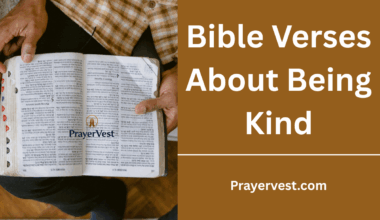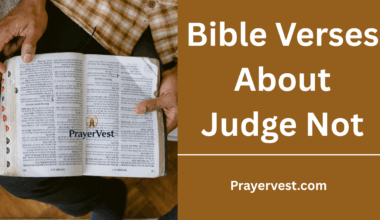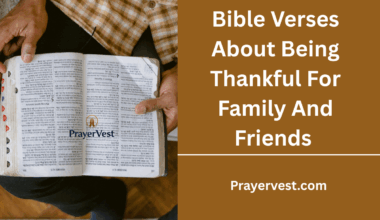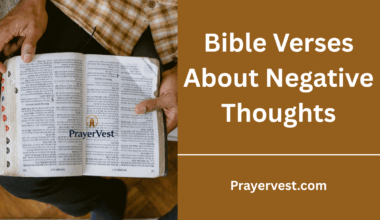Two of the most significant themes in Scripture are death and eternal life, which provide both grim truth and unending hope. Although the Bible accepts that death is a natural part of life, it also guides us toward the promise of eternal life with God.
Because of Jesus Christ’s death and resurrection, believers view death as a gateway to eternal life rather than its conclusion. These facts offer consolation during difficult times, bravery in the face of death, and confidence that God’s promises go much beyond the fleeting hardships of this world.
Death frequently causes grief, fear, and unresolved concerns in our human experience. However, the Bible tells us that the grave has been vanquished and death has become insignificant because of Christ.
For those who put their faith in the Lord, eternal life is a certain guarantee rather than a hazy hope. The Bible’s teachings on death and everlasting life help us to see past the anguish of loss and adopt the eternal viewpoint, which holds that joy, serenity, and love never fade in God’s presence.
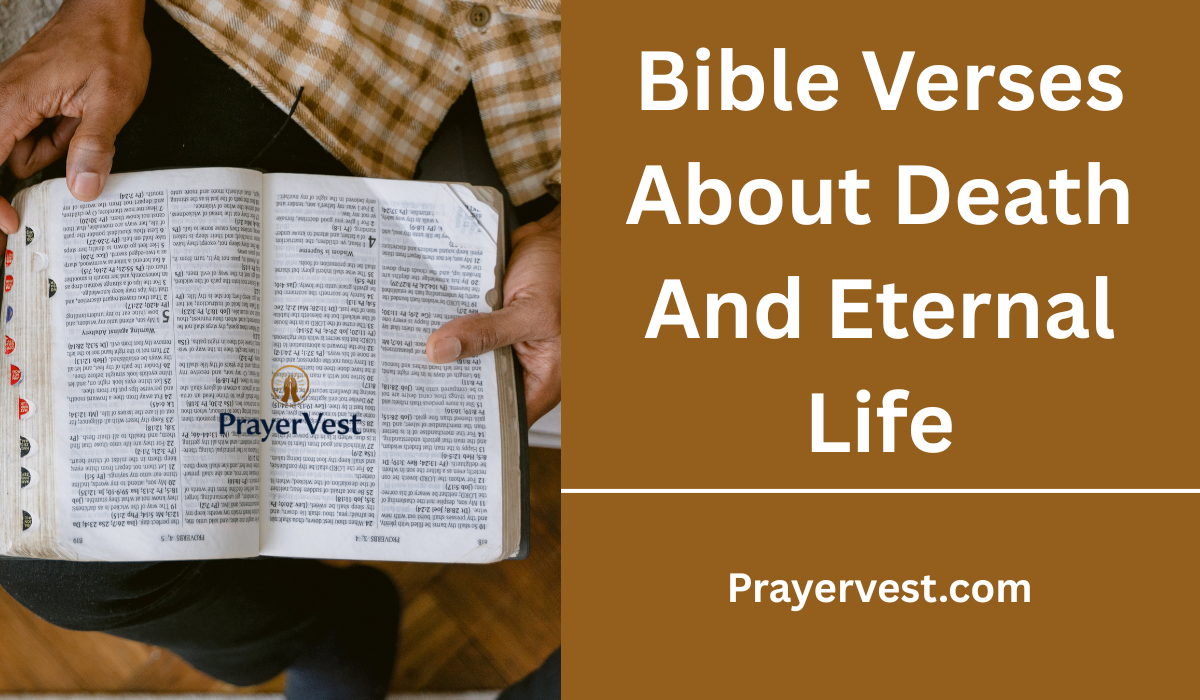

By illuminating difficult circumstances and leading us toward the promise of paradise, studying Bible passages about death and eternal life fortifies our faith. These verses give us comfort in knowing that God’s everlasting plan, not our worldly existence, defines our lives. The Bible provides consolation, guidance, and the unwavering promise of a future firmly rooted in Christ, regardless of whether you are dealing with personal grief, contemplating the fact of mortality, or looking for assurance of eternal life.
40 Powerful Bible Verses About Death And Eternal Life (2026)
1. Psalm 23:4
“Even though I walk through the valley of the shadow of death, I will fear no evil, for you are with me; your rod and your staff, they comfort me.”
This verse is a profound assurance of God’s presence in the darkest moments of life, including the approach of death. David expresses unwavering confidence that even in the shadow of mortality, God’s guidance and protection remain constant. The “rod and staff” symbolize God’s authority and comfort, giving believers courage in the face of fear. This verse teaches that death does not signify abandonment but rather becomes a place where God’s nearness is most deeply felt.
2. Psalm 49:15
“But God will redeem my life from the grave; he will surely take me to himself.”
This psalm contrasts the fate of the wicked who trust in riches with the hope of the righteous who trust in God. While death overtakes everyone, the psalmist finds confidence in God’s power to redeem beyond the grave. The verse points toward eternal life, portraying death not as the end but as a transition into God’s presence. It offers a glimpse of resurrection hope, affirming that those who belong to God are never abandoned to corruption but are received by Him into everlasting life.
3. Psalm 73:26
“My flesh and my heart may fail, but God is the strength of my heart and my portion forever.”
Here, the psalmist acknowledges human frailty and the inevitability of physical death but declares a greater truth—God Himself is eternal and becomes the everlasting inheritance of His people. Though our bodies weaken and our days on earth end, our hope rests in the eternal portion of God’s presence. This verse shifts focus from temporary life to eternal security, teaching us that true strength is found not in our vitality but in God’s sustaining promise of forever life with Him.
4. Psalm 116:15
“Precious in the sight of the LORD is the death of his faithful servants.”
This verse reminds us that God values the lives of His people and even regards their death as precious. Unlike the world, which often fears and despises death, God sees it as a sacred moment when His faithful ones are ushered into eternal life with Him. It affirms that a believer’s death is not meaningless or tragic but a divine homecoming. This perspective brings comfort to those grieving, assuring them that God Himself treasures the transition of His children into eternity.
5. Psalm 118:17
“I will not die but live, and will proclaim what the LORD has done.”
This declaration reflects a psalmist’s confidence in God’s deliverance from near-death experiences. Instead of succumbing to despair or defeat, the writer sees life preserved as an opportunity to testify to God’s goodness. This verse affirms that the preservation of life has a purpose beyond survival—it is meant to glorify God. For Christians, it also points to the ultimate victory of eternal life through Christ, where even death cannot silence the testimony of God’s saving power.
6. Psalm 34:18-19
“The LORD is close to the brokenhearted and saves those who are crushed in spirit. The righteous person may have many troubles, but the LORD delivers him from them all.”
This psalm assures that God draws near in times of grief and distress, particularly when death and loss weigh heavily on the heart. Though troubles are unavoidable, God’s deliverance extends beyond earthly suffering into eternal security. These verses highlight God’s compassion for those grieving and His promise of ultimate rescue. For the believer, this means that even when death strikes, it does not have the final word—God’s nearness and salvation prevail.
7. Psalm 48:14
“For this God is our God for ever and ever; he will be our guide even to the end.”
This verse emphasizes God’s eternal faithfulness and continual guidance, even up to the moment of death. Unlike temporary helpers, God’s presence never ceases. He is not only a protector in life but also a shepherd into eternity. This assurance reminds believers that they are never abandoned at life’s end; instead, God Himself leads them through death into eternal fellowship. It is a promise of divine companionship that stretches beyond the boundaries of earthly existence.
8. Psalm 146:4
“When their spirit departs, they return to the ground; on that very day their plans come to nothing.”
This verse provides a sobering reminder of human mortality and the futility of earthly ambitions. Death halts all worldly pursuits and reminds us that wealth, power, and personal agendas cannot transcend the grave. Yet, hidden within this truth is a call to live wisely—investing in eternal treasures that outlast death. The psalm teaches us to place hope not in fleeting achievements but in God, whose promises extend beyond the grave into eternal life.
9. Psalm 30:5
“Weeping may stay for the night, but rejoicing comes in the morning.”
Although often quoted in times of hardship, this verse also speaks profoundly to the hope of eternal life. Death may bring sorrow, grief, and tears, yet for those who trust in God, joy awaits beyond the night of suffering. The “morning” symbolizes resurrection and the eternal joy of being in God’s presence. This verse assures believers that death’s sorrow is temporary, and eternal joy will break forth like dawn after the darkest night.
10. Psalm 39:4
“Show me, LORD, my life’s end and the number of my days; let me know how fleeting my life is.”
This prayer for wisdom highlights the brevity of life and the certainty of death. By recognizing the shortness of our days, we are encouraged to live with greater purpose, humility, and reliance on God. The psalmist teaches us that awareness of mortality is not meant to bring despair, but rather to inspire a life centered on eternal priorities. When we understand that life is fleeting, we prepare our hearts for the everlasting life that God promises.
11. Psalm 90:12
“Teach us to number our days, that we may gain a heart of wisdom.”
This verse urges us to recognize the brevity of life as a pathway to true wisdom. By acknowledging death as an inevitable reality, we are guided to live more intentionally, focusing on what truly matters. Rather than wasting time on fleeting pleasures, the psalmist calls us to live with eternity in mind. This prayer reminds believers that awareness of mortality should lead us not to fear, but to deeper faith, gratitude, and readiness for eternal life.
12. Psalm 116:8
“For you, LORD, have delivered me from death, my eyes from tears, my feet from stumbling.”
Here, the psalmist celebrates God’s intervention in moments of near-death and despair. Deliverance is seen not just as physical rescue but as an assurance of God’s sustaining hand through life and into eternity. The verse acknowledges that God protects His people both from stumbling in this world and from eternal separation from Him. It inspires believers to trust that God’s salvation reaches beyond temporal trials into everlasting safety.
13. Psalm 37:37-38
“Consider the blameless, observe the upright; a future awaits those who seek peace. But all sinners will be destroyed; there will be no future for the wicked.”
This passage contrasts the destinies of the righteous and the wicked. While death comes to all, the future of the righteous is secure in God’s promise of eternal peace. The wicked, by contrast, face destruction without hope. This psalm underscores how we live now has eternal consequences, urging believers to live in righteousness and peace. Eternal life is portrayed as the reward of faithfulness, while eternal loss awaits those who reject God.
14. Psalm 121:7-8
“The LORD will keep you from all harm—he will watch over your life; the LORD will watch over your coming and going both now and forevermore.”
These verses are a powerful assurance of God’s eternal protection. While physical harm and death may come in this world, God’s ultimate keeping extends beyond earthly life. His guardianship is not bound by time but stretches into eternity. This psalm reminds us that the believer’s life is never truly lost; God’s watchful care continues beyond the grave. It is a comforting promise for those facing uncertainty, assuring them that their eternal destiny is secure in His hands.
15. Psalm 17:15
“As for me, I will be vindicated and will see your face; when I awake, I will be satisfied with seeing your likeness.”
This verse captures a glimpse of resurrection hope in the Old Testament. The psalmist longs not for earthly vindication alone but for the ultimate joy of seeing God face-to-face. “Awakening” here reflects not only daily renewal but also points toward life after death, where true satisfaction is found in God’s presence. This verse affirms that eternal life is not merely the absence of death, but the fulfillment of being in communion with God forever.
16. Psalm 49:10-11
“For all can see that the wise die, that the foolish and the senseless also perish, leaving their wealth to others. Their tombs will remain their houses forever, their dwellings for endless generations, though they had named lands after themselves.”
This verse reflects on the reality of death’s universality—both wise and foolish alike perish. Earthly wealth and possessions cannot prevent death, nor can they be carried beyond the grave. The psalmist reminds us that earthly status fades, but our eternal destiny remains. This truth challenges believers to live for eternal treasures, not temporary gains, recognizing that only a relationship with God transcends death.
17. Psalm 68:20
“Our God is a God who saves; from the Sovereign LORD comes escape from death.”
This verse proclaims God’s unique power over death itself. Unlike false gods, the Lord holds authority to save and deliver His people from the grip of mortality. The psalmist affirms that death is not beyond God’s reach; rather, He is the source of life eternal. For believers, this foreshadows the ultimate victory of Christ over death, reminding us that salvation includes not only forgiveness of sins but also deliverance into everlasting life.
18. Psalm 55:22
“Cast your cares on the LORD and he will sustain you; he will never let the righteous be shaken.”
Though not directly about death, this verse offers comfort for those facing mortality and grief. The psalmist assures that God sustains His people in life’s heaviest burdens, including the fear of death. The phrase “never let the righteous be shaken” points toward eternal security, where God’s faithfulness holds firm even when earthly life fades. It teaches us that in both life and death, believers are upheld by God’s unshakable hand.
19. Psalm 71:20-21
“Though you have made me see troubles, many and bitter, you will restore my life again; from the depths of the earth you will again bring me up. You will increase my honor and comfort me once more.”
This powerful testimony speaks of God’s ability to restore life even after immense suffering. The psalmist looks beyond temporary struggles to God’s ultimate restoration—resurrection from the grave. The imagery of being lifted “from the depths of the earth” portrays hope that death is not final. This verse assures believers that trials may scar them, but God’s eternal promise will raise them into His comfort and honor forever.
20. Psalm 37:18-19
“The blameless spend their days under the LORD’s care, and their inheritance will endure forever. In times of disaster they will not wither; in days of famine they will enjoy plenty.”
Here, the psalmist contrasts the fleeting fate of the wicked with the enduring inheritance of the righteous. While the world is shaken by disaster and scarcity, God ensures His people’s future is secure—not only in this life but in eternity. This verse reminds believers that their inheritance is not in earthly possessions but in God’s eternal care. Death does not erase their portion, for it extends into everlasting life with the Lord.
21. Psalm 27:13–14
“I remain confident of this: I will see the goodness of the LORD in the land of the living. Wait for the LORD; be strong and take heart and wait for the LORD.”
This verse expresses unshakable confidence that life with God does not end with death but extends into the eternal “land of the living.” The psalmist clings to hope even in the face of despair, urging believers to trust in God’s timing. Waiting on the Lord here points not only to present deliverance but also to the ultimate hope of eternal life. It is a call to courage and patience, rooted in the assurance of God’s goodness beyond the grave.
22. Psalm 84:10
“Better is one day in your courts than a thousand elsewhere; I would rather be a doorkeeper in the house of my God than dwell in the tents of the wicked.”
This verse highlights the surpassing joy of dwelling in God’s presence compared to the fleeting pleasures of earthly life. Even the lowest place in God’s eternal house is greater than the highest earthly honor. The psalmist captures the longing for eternal fellowship with God, showing that true satisfaction is found not in worldly pursuits but in being near to Him forever. It inspires believers to value eternal life over temporary gain.
23. Psalm 31:5
“Into your hands I commit my spirit; deliver me, LORD, my faithful God.”
These words, later echoed by Jesus on the cross, are a profound expression of surrender and trust in God even at the point of death. The psalmist entrusts his very spirit to the Lord, confident that God’s faithfulness will preserve him beyond the grave. This verse shows us that death is not an end but a release into God’s eternal care. It is both a prayer of trust and a declaration of hope in eternal life.
24. Psalm 103:15-17
“The life of mortals is like grass, they flourish like a flower of the field; the wind blows over it and it is gone, and its place remembers it no more. But from everlasting to everlasting the LORD’s love is with those who fear him.”
This passage contrasts human frailty with God’s everlasting love. While our lives fade quickly like grass, God’s covenant love endures beyond time and death. The psalm assures believers that even though mortality is inevitable, God’s steadfast love secures an eternal relationship with Him. It reminds us to view death not as the end of life but as the beginning of experiencing God’s unending love.
25. Psalm 142:5
“I cry to you, LORD; I say, ‘You are my refuge, my portion in the land of the living.’”
In this cry of desperation, the psalmist declares that God Himself is his ultimate portion and security. “The land of the living” represents both earthly deliverance and eternal life with God. While human help fails, God remains a constant refuge beyond death. This verse reminds us that when we face mortality, our hope lies not in human strength but in the eternal inheritance God provides.
26. Job 19:25-26
“I know that my redeemer lives, and that in the end he will stand on the earth. And after my skin has been destroyed, yet in my flesh I will see God.”
Job, amid deep suffering, expresses remarkable faith in the promise of resurrection. Even though his body will decay, he is confident that he will one day see God face-to-face. This passage foreshadows the resurrection hope fulfilled in Christ. It assures believers that physical death is not the end, but rather a doorway into eternal communion with God.
27. Isaiah 25:8
“He will swallow up death forever. The Sovereign LORD will wipe away the tears from all faces; he will remove his people’s disgrace from all the earth. The LORD has spoken.”
This prophetic promise speaks directly to God’s victory over death. Isaiah envisions a future where sorrow and mortality are no more, and God Himself wipes away every tear. This verse echoes throughout the New Testament, culminating in Revelation’s vision of eternal life. It provides comfort that death, though painful, is temporary and destined to be overcome by God’s eternal reign.
28. Isaiah 40:31
“But those who hope in the LORD will renew their strength. They will soar on wings like eagles; they will run and not grow weary, they will walk and not be faint.”
Though often applied to daily encouragement, this verse also speaks to eternal renewal. Human strength inevitably fails, especially in the face of death, but those who place their hope in the Lord find everlasting vitality. The imagery of soaring like eagles reflects the resurrection hope that believers will rise beyond the grave with renewed life in God’s presence.
29. Daniel 12:2
“Multitudes who sleep in the dust of the earth will awake: some to everlasting life, others to shame and everlasting contempt.”
This is one of the clearest Old Testament references to the resurrection of the dead. Daniel reveals that death is not the end, but all will rise to face eternity—either in everlasting life or judgment. The passage underscores the seriousness of our choices in this life, reminding believers that eternal destinies are at stake. For the faithful, this verse offers hope of resurrection and eternal joy in God’s presence.
30. Ecclesiastes 12:7
“And the dust returns to the ground it came from, and the spirit returns to God who gave it.”
This verse reflects on the reality of death and the destiny of the human spirit. While the body decays and returns to the earth, the soul is not lost—it returns to God, its Creator. This truth affirms that death is not annihilation but transition. For the believer, it assures that our spirit finds its home in the presence of the Lord, beyond the limits of earthly existence.
31. John 11:25-26
“Jesus said to her, ‘I am the resurrection and the life. The one who believes in me will live, even though they die; and whoever lives by believing in me will never die. Do you believe this?’”
In this powerful declaration to Martha after Lazarus’ death, Jesus reveals Himself as the source of eternal life. Physical death may come, but those who believe in Him live forever. This verse is the cornerstone of Christian hope, teaching that eternal life is not just a future promise but a present reality in Christ. It assures believers that death cannot separate them from life in Him.
32. John 14:1-3
“Do not let your hearts be troubled. You believe in God; believe also in me. My Father’s house has many rooms… I am going there to prepare a place for you.”
Jesus comforts His disciples with the promise of eternal dwelling in His Father’s house. His words assure believers that death is not the end but a passage into God’s eternal home. The “many rooms” symbolize the inclusiveness of God’s kingdom and the certainty of eternal fellowship. This verse gives peace to all who face loss or mortality, reminding them that Jesus Himself is preparing an everlasting place for His people.
33. John 3:16
“For God so loved the world that he gave his one and only Son, that whoever believes in him shall not perish but have eternal life.”
This verse is the heart of the Gospel message. God’s love for humanity is demonstrated in the sacrifice of His Son, ensuring eternal life for all who believe. Death no longer holds the final word, for faith in Christ secures everlasting life. This verse highlights that eternal life is not earned but given as a gift through belief in Jesus. It remains the ultimate assurance against the fear of death.
34. John 5:24
“Very truly I tell you, whoever hears my word and believes him who sent me has eternal life and will not be judged but has crossed over from death to life.”
Here, Jesus promises that belief in Him brings immediate passage from death to life. Eternal life is not only a future hope but a present possession for the believer. This verse teaches that through faith, judgment and condemnation are removed, and death is transformed into eternal life with God. It affirms the security and assurance that come with trusting in Christ.
35. 2 Corinthians 5:1
“For we know that if the earthly tent we live in is destroyed, we have a building from God, an eternal house in heaven, not built by human hands.”
Paul describes the human body as a temporary “tent,” fragile and perishable, but he contrasts it with the eternal dwelling God has prepared in heaven. Death may destroy the earthly body, but the believer’s true home is eternal and indestructible. This verse assures Christians that death is not the loss of home but the entry into their everlasting residence with God.
36. 1 Corinthians 15:54-55
“When the perishable has been clothed with the imperishable, and the mortal with immortality, then the saying that is written will come true: ‘Death has been swallowed up in victory.’ ‘Where, O death, is your victory? Where, O death, is your sting?’”
Paul celebrates the resurrection of believers, where death loses its power forever. Through Christ’s victory, mortality is exchanged for immortality. This triumphant passage reminds Christians that death is not the end but the doorway to eternal victory. It transforms the fear of death into confidence in God’s ultimate promise of everlasting life.
37. Philippians 1:21-23
“For to me, to live is Christ and to die is gain. If I am to go on living in the body, this will mean fruitful labor for me… I desire to depart and be with Christ, which is better by far.”
Paul’s words express a profound perspective on life and death. While life on earth provides ministry opportunities, death is seen as a greater gain because it brings believers into the direct presence of Christ. This verse teaches that eternal life is not something to fear but to long for, as it fulfills the deepest desire of every believer—to be united with the Lord forever.
38. 1 Thessalonians 4:16-17
“For the Lord himself will come down from heaven, with a loud command, with the voice of the archangel and with the trumpet call of God, and the dead in Christ will rise first. After that, we who are still alive and are left will be caught up together with them in the clouds to meet the Lord in the air. And so we will be with the Lord forever.”
This passage describes the return of Christ and the resurrection of believers. Death will be undone as the dead in Christ rise, and all who believe will be united with the Lord forever. It offers comfort and assurance that death does not separate believers permanently, but that eternal reunion with Christ awaits. This verse anchors the Christian hope in the promise of resurrection and everlasting fellowship.
39. Romans 6:5
“For if we have been united with him in a death like his, we will certainly also be united with him in a resurrection like his.”
Paul connects believers’ union with Christ’s death and resurrection. Just as Jesus died and rose again, those who belong to Him share in that victory over death. This verse assures Christians that eternal life is guaranteed because of their union with Christ. Death becomes not a defeat but participation in the resurrection power of the Savior.
40. Revelation 21:4
“He will wipe every tear from their eyes. There will be no more death or mourning or crying or pain, for the old order of things has passed away.”
The final vision of Scripture reveals the complete end of death and suffering. In the new heaven and new earth, God’s people will experience eternal joy, free from sorrow and mortality. This verse encapsulates the ultimate Christian hope: eternal life in God’s presence where death itself is destroyed forever. It reassures believers that every pain endured in this life will give way to everlasting peace.
Conclusion
In conclusion, the lessons found in the Bible on death and eternal life serve as a potent reminder that although life on earth is fleeting, our souls were made to spend all of eternity with God. For believers, death is a passage into eternal fellowship with the Lord rather than the end of their story. We are assured that death has been vanquished and that everyone who believes is eligible for eternal life because of Jesus Christ’s resurrection. This reality changes the way we deal with loss, anxiety, and uncertainty by substituting unwavering hope for despair.
Scripture ultimately exhorts us to live with eternity in mind, clinging to God’s promises even when life seems precarious or overwhelming. The passages about death and eternal life inspire us to walk in trust, grieve with hope, and joyfully anticipate the day when we will be permanently joined to Christ. May we be reassured, our faith fortified, and our lives filled with the knowledge that eternal life is our greatest gift and ultimate destiny in Christ as we consider these realities.

